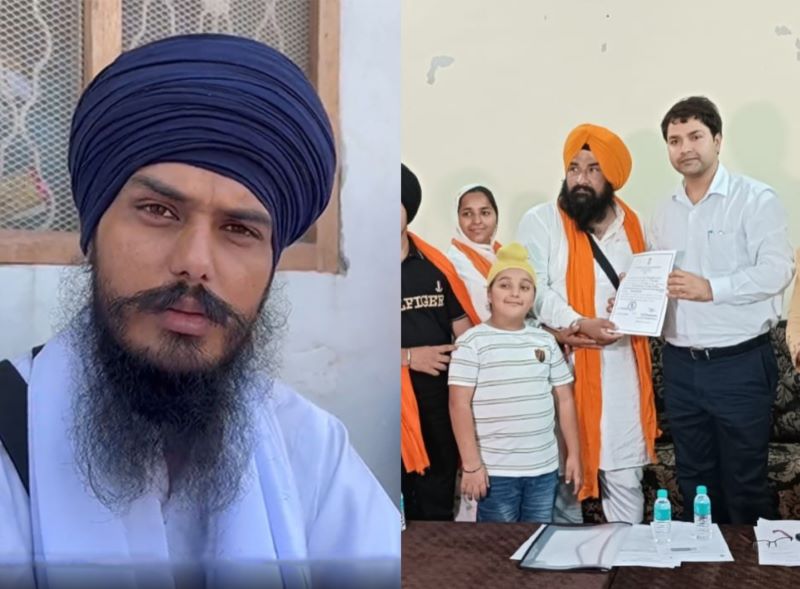 Punjab
Punjab
Punjab: Victory of pro-Khalistan leaders in Lok Sabha polls rings alarm bells
In Punjab, the victory of two Independent candidates in the Lok Sabha elections - Amritpal Singh, a Khalistan propagator, currently in jail, and Sarabjeet Singh Khalsa, son of former Prime Minister Indira Gandhi’s assassin Beant Singh, has sparked shock and deep concern in various circles.
The electoral victory of radical elements in the state, which shares an international border with Pakistan, is disconcerting for political observers and leaders.
Political experts feel that with people backing the radical elements, a disquieting feeling will certainly prevail in Punjab, which has gone through a traumatic phase of militancy between the mid-1980s and early-1990s over the demand for ‘Khalistan’, a separate Sikh homeland that is largely patronized by India's hostile neighbours with bases in the western countries like Canada.
Amritpal Singh won Punjab's Khadoor Sahib seat defeating Congress's Kulbir Singh Zira by a huge margin of 1,97,120 votes. He is currently languishing in a prison in Assam.
In Faridkot, Khalsa won by 70,053 votes, defeating Aam Aadmi Party’s Karamjit Singh.
Both are set to make their maiden entry into Parliament.
Who is Amrtipal Singh?
Amritpal, who styled himself after slain Khalistani militant Jarnail Singh Bhindranwale, was arrested in Moga's Rode village on April 23 last year following an over a month-long manhunt.
The Khalistani sympathiser had escaped the police net in Jalandhar district on March 18, switching vehicles and changing appearances.
Amritpal, who had supported calls for the formation of Khalistan, a separate Sikh homeland, was wanted for several charges, including attempted murder, obstruction of law enforcement, and creating disharmony.
He and his supporters, armed with swords, knives, and guns, had raided a police station in March and clashed with policemen.
Know about Sarabjeet Singh Khalsa:
Sarabjeet Singh Khalsa is the son of Beant Singh who was a former bodyguard and one of the assassins of former Indian Prime Minister Indira Gandhi. His grandfather, Baba Sucha Singh, was also a former member of Parliament.
Khalsa contested the Lok Sabha election in 2004 from Bathinda Lok Sabha seat and got 1,13,490 votes. He contested the Punjab Assembly election in 2007 from Bhadaur in Barnala district and got only 15,702 votes.
In 2009 and 2014 he again unsuccessfully contested from Bathinda and Fatehgarh Sahib constituencies respectively.
Khalsa led his 2024 election campaign over 'panthic’ (Sikh) issues bringing up the Kotkapura-Behbal Kalan police firing incidents of 2015, which occurred after the sacrilege of Guru Granth Sahib at Bargari village in Faridkot. Two persons were killed in the police firing during protests.
He also raised the issue of the release of ‘Bandi Singhs’ (Sikh prisoners) who had completed their terms. Khalsa’s mother Bimal Kaur was an MP from the Ropar seat in 1989.
Experts' view:
Pramod Kumar, director of the Institute for Development and Communication in Chandigarh, feels that this election showed that the moderate space is weakening and the fringe radicals are gaining space in the religious or panthic constituencies in Punjab.
"The worrying factor is that people have rallied behind them – be it Amritpal or Sarabjit. The counter-narrative appears to be weak in Punjab. The moderate ‘panthic’ politics has gone weak and that space is being occupied by radicals,” he was quoted saying by The Hindu.
"In this election, the fringe radicals got a notable response from the youth. Their main emphasis is on the denial of justice to the ‘Bandi Sikhs’, the exodus of youth from Punjab and the migration to the State of labour from Bihar and Uttar Pradesh. The negation of the agenda of peace and communal harmony, and one-upmanship in power politics, has weakened the moderate space. This is disquieting,” he added.
Shashi Kant, former Director-General of Police (DGP), Punjab said the win of radicals will certainly embolden the hardliners as they would propagate the message that they are getting strong, which is dangerous.
“However, there is a catch 22 situation for these radicals as well. When they will have to join the Parliament they would have to swear allegiance to India’s constitution, which defeats their cause. If they do that they would lose support, especially from abroad,” he told The Hindu.
Support Our Journalism
We cannot do without you.. your contribution supports unbiased journalism
IBNS is not driven by any ism- not wokeism, not racism, not skewed secularism, not hyper right-wing or left liberal ideals, nor by any hardline religious beliefs or hyper nationalism. We want to serve you good old objective news, as they are. We do not judge or preach. We let people decide for themselves. We only try to present factual and well-sourced news.







